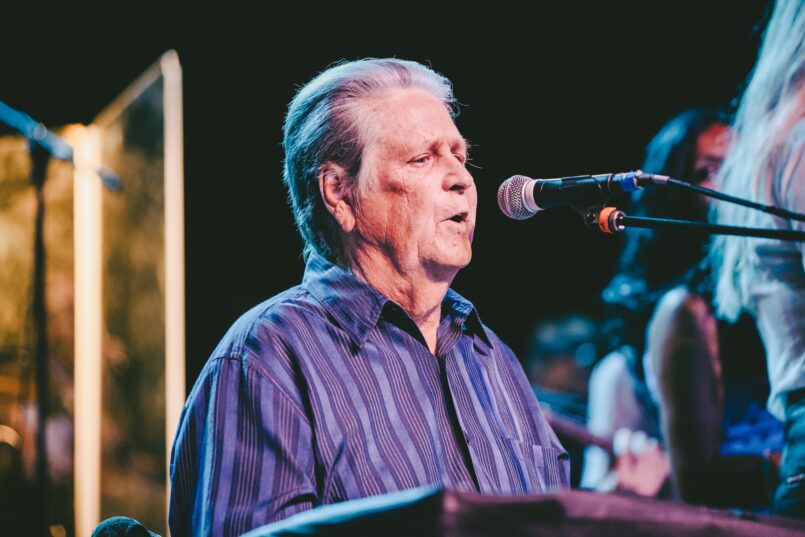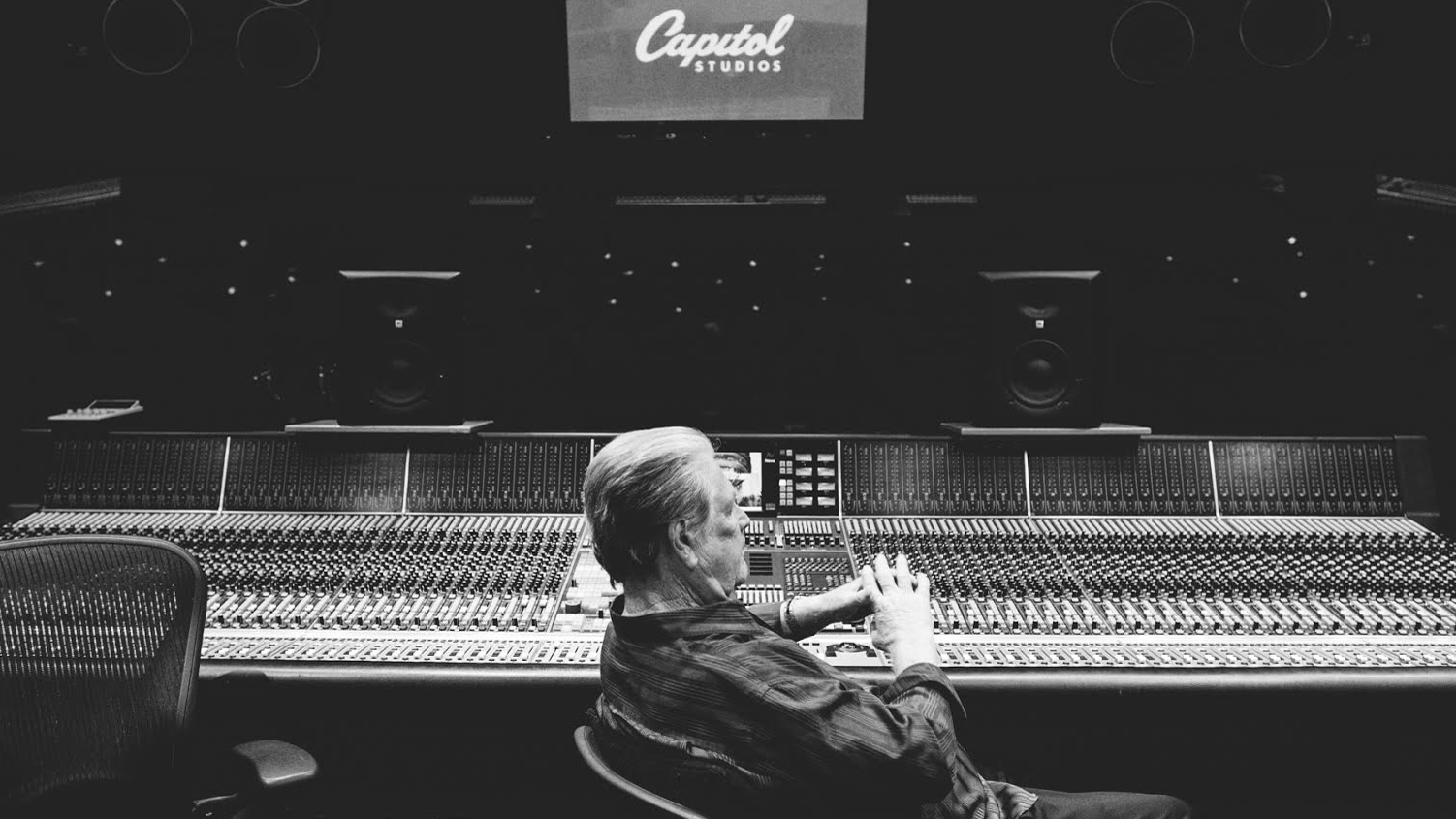There are these profound, abstract moments that sometimes occur at the tail end of childhood, when your understanding of the world changes. Spacetime takes a hard left and the impact can be felt for the rest of your life. As you move through history, the exact details become obscure, but like a lingering dream, the feeling remains indelible. These are moments of floored developmental acceleration whose resonant power and influence can paradoxically lead you into an endless skid. A frenzy of change ensues. Lessons are drawn and learned. For the lucky ones, this shift comes from loving and being loved for the first time. Or it may come from learning what you’re capable of—so hang on to your ego. Maybe you get this awareness in a parked car, or, maybe, outside on the hood. Regardless of the make and model, it feels safe to say that no artist has ever been more in tune with this phenomenon than Brian Wilson of The Beach Boys.
In 1966, at the apex of his musical enlightenment and revved up by the imminent success of The Beatles’ Rubber Soul, Wilson found himself crafting Pet Sounds, which turned away from the commercially viable fun, fun, fun of The Beach Boys’ surfer-pop period and toward more complex and ruminative emotional territories. It would go on to become one of the greatest albums ever made, and it’s impossible to imagine a better record to score the scene described above. That is to say, to hear Pet Sounds is to hear a gifted young man coming to understand his own potential—a moment that can never be forgotten.
Director Bill Pohlad shows us two such moments in the life of the great artist in Love & Mercy, the terrific new film about Wilson’s life. First, Paul Dano’s young Brian takes a breather outside of the Pet Sounds recording sessions, sitting on the hood of a dark blue Chevy, when Hal Blaine (Johnny Sneed), the legendary Wrecking Crew session drummer, asks Wilson for a light before letting him know just how “touched” he is, and that Phil Spector basically eats his dust.
The second moment takes place twenty years later, long after Wilson had driven himself into isolation while attempting to forge his unfinished masterpiece Smile, and the infamous tales of pianos in sandboxes and years spent in bed have already made their rounds about the zeitgeist. Here, John Cusack’s older Brian walks into a Cadillac dealership and manages to have a rare conversation removed from the diligent watch of his domineering psychiatrist, Dr. Eugene Landy (Paul Giamatti). Sitting in the front seat of a shiny new navy Fleetwood, Wilson experiences a real connection with saleswoman Melinda Ledbetter (Elizabeth Banks), who would eventually go on to become Mrs. Melinda Wilson. “These Dreams” by Heart pulsates from the showroom speakers. Cusack’s Brian, worn down from years of mental exhaustion and over-medication, is lucky enough to realize his potential here a second time by meeting the woman who will help him out of a deep hole and help him reclaim control of his life. Wilson would end up selling the Caddy a few years later, but his marriage to Melinda remains stronger than ever.
“I had a rough time watching it,” the real Brian Wilson says of Love & Mercy over the phone from his home in southern California. “It brought back some of the bad drugs I took in my life, and it was very, very difficult for me.” Clearly, Wilson’s demons continue to have a profound effect on his psyche, but he is much less reticent to revisit the musical highs depicted in the film. “The parts where I was producing records were very, very, very interesting, and I was very happy with it,” he adds.
Wilson was also pleased with the two actors who depict him in the film, both of whom he describes as “geniuses.” He “spent about a week” getting to know Dano and Cusack on set during the shooting of Love & Mercy. While both actors found their time visiting with Wilson to be invaluable and gratifying, each cites the music as the driving force behind his respective performance.
“My own opinion is that you can hear everything about Brian in his music,” says Cusack, who favored 2011’s The Smile Sessions but “dove in” to the entire Wilson oeuvre while preparing for his role. “If you just listen carefully, it’s all there.” Similarly, Dano, who only met Cusack on set briefly, found most of his inspiration in Wilson’s life on record.
“Bill [Pohlad] said, ‘If we can get even just a little of Brian’s spirit, we’re going to be okay,” Dano says. “For somebody as honest and raw as Brian, to go for any sort of mimicry felt like the opposite of what we wanted. Even though John and I never talked about finding our characters, I think we both found that Brian is his music, and that’s where that kind of spirit comes from. It all seems to keep amounting to music.”
“You can hear everything about Brian in his music,” says John Cusack. “If you just listen carefully, it’s all there.”
Although Wilson is still actively writing music—No Pier Pressure, his eleventh solo album, was released in April—these days he seems to favor a more peaceful lifestyle at home with his wife and kids, along with a sizable pack of dogs, including two poodles, pit bulls, and an assortment of “about eight or ten little dogs.”
“I like watching my kids play, and I do a lot of exercise at a park—I try to stay in good shape,” Wilson says. When asked if any sounds in nature inspire him, Wilson’s answer, much like the man himself, is at once familiar and surprising.
“The sound of my dogs barking and the sound of my television,” he explains. “The people on my television, mostly the newscasters.” As if by omniscient cue, right after he delivers the answer, a chorus of dogs can be heard barking in the background. While the canine symphony is surely not without its inspirational value, Wilson shouts at them to be quiet for the time being.
Wilson is also inspired not by dreams—he claims he can’t remember them—but by the lingering sense of what a profound dream felt like. Among other songs, he says that The Beach Boys’ classic “Surfer Girl” was written in the wake of such a dream. The notion finds a certain resonance with many of Wilson’s slower and more pensive compositions, with songs like “Surfer Girl” or “Don’t Worry Baby” or the Pet Sounds spearhead “God Only Knows” serving as prime examples. The lyrics on such tracks paint straightforward youthful narratives that are instantly recognizable, but there’s profound emotional depth in his musical compositions, which ties back to what Dano and Cusack may have been accessing in their own listening experiences. One of the lost Smile tracks, “Surf’s Up,” has long been considered by many Wilson enthusiasts to be his holy grail and might be the best indication of what might have been.
Maybe the notion that Brian Wilson’s life is contained within his music stems from the fact that he just believes in it more than we’re used to.
“‘Surf’s Up’ is what I would call a great song,” Wilson says himself. “I wrote that with my collaborator Van Dyke Parks, and it was a really, really, really well-written song with a good melody and good chorus. Very different.” Assuming the form of a mini suite, the ironically titled “Surf’s Up” chronicles a sort of spiritual awakening, shifting from a wondrous build of trumpet, xylophone, and Wilson’s trademark falsetto into the “chorus” (a brooding flow of piano) which gives way to a counterpoint vocal harmony section that justifies the song’s lofty scope. Its lyrical conclusion? “I heard the word / Wonderful thing/ A children’s song.”
Maybe the notion that Brian Wilson’s life is contained within his music stems from the fact that he just believes in it more than we’re used to. Though he claims to never have considered being born at a different time in history, one could imagine him as Amadeus in a room, mad as a clam, with only his symphonic mind and a pen. For Wilson, the concept of music extends even further still.

Brian Wilson performs at Brian Fest in March 2015 / photo by Rozette Diaz Rago
“I feel that God is spiritual music,” he says. “I believe that.” Wilson does not recall his dreams, but he remembers how they feel. He doesn’t find God in music, but instead hears music as God.
In the aftermath of his early career with The Beach Boys, his alienation from fame, and his subsequent mental struggles, Brian Wilson met Melinda Ledbetter in a Cadillac showroom and married her. In the third movement of his lifelong suite, Wilson’s time is mostly spent with his wife, living in wellness and enjoying “a really amazing, beautiful life together,” says Elizabeth Banks. “The fact that they have not just survived, but thrived, in this chapter was very inspiring and gave me the long view of this whole story.”
Wilson’s life has swelled as massively as a tidal wave, and has crashed in due proportion, but rest assured, this great artist has finally learned to sustain his own eternal moment in the comfort of the resultant wash. FL








